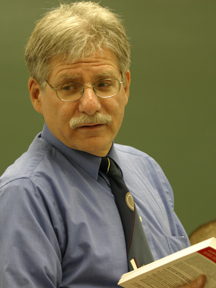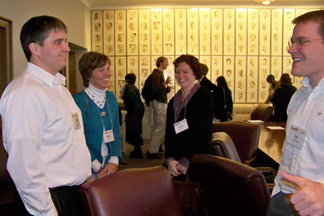There were 650 scholars in attendance at the
International Society of Teaching and Learning conference, and only about a dozen of the attendees were not faculty or staff. But the three Wabash men who presented at the conference left quite an impression.

The Wabash guys — current student Marquise Triplett along with Brandon Christy ’09 and Brian Weil ’08 — accompanied Warren Rosenberg to the conference. Rosenberg was on the conference agenda to discuss research of his Freshman Tutorial on men and masculinity, a course he’s now taught to approximately 100 Wabash students since its inception in 1993.
“Over the past two years I have been studying how a freshman seminar on men and masculinity at all-male Wabash College has affected student attitudes toward gender, primarily using interviews conducted by trained student interviewers who have taken the class,” Rosenberg wrote in his abstract for the proceedings.
The group presented the paper, “Reading Men, Changing Men: How Engaging in Scholarship of Teaching and Learning Research Affected Student Attitudes Toward Masculinity,” at the conference hosted in Bloomington, Indiana.
In an extension of Rosenberg’s research, Christy and Weil (both of whom took Rosenberg’s course) conducted a large number of interviews with past participants in the course. At the conference, the duo presented papers about their interviews, but moreover got the attention of the crowd because of how those interviews affected their own attitudes toward gender — and how their learning had continued and evolved over their time at Wabash.
“Revisiting the course through doing the interviewing and analysis reinforced the learning they had begun in the tutorial as freshmen,” said Professor Rosenberg. “The idea here is that the learning students do does not end when the course ends. When they get a chance to re-engage in the material later on in their careers, they bring their new maturity and other learning experiences to bear, and thus their learning is enriched.”
.jpg)
Brandon Christy gave a talk about how his views toward masculinity evolved during the course of his time at Wabash, and that by revisiting the topic through interviews with past tutorial participants, he drew new conclusions about his own experiences. In particular, Christy discovered how many Wabash students change their view of “normal.”
“I think that the problems that surface by having a rigid view of masculinity are the same problems faced when one has a rigid view of how ‘thin’ a person should be,” Christy told the scholars of teaching and learning. “The norm... is also tagged as being ‘right.’ The farther away you are from the norm, the odder and ‘more incorrect’ you are perceived by the masses. It’s just like the normal curve in statistics. Unlike statistics, however, we’re not dealing with numbers. We are dealing with human beings.
“What I would take away from my time at Wabash is that the ‘norm’ isn’t always right. In fact, [for me] being different was quite normal, after all.”
Brian Weil had a similar experience. He interviewed a tutorial participant whose father had committed suicide. The two men talked about their relationships with their fathers, and Weil’s subject reminded him that while it’s okay to want to be like your father, it’s important to remember that some percentage of your father’s life is unhealthy and should be avoided.
The conversation — grounded in the topics discussed in Rosenberg’s class — helped Weil come to terms with the death of his own father shortly thereafter.
“After the manic hysteria connected with the event faded, I thought about what that kid had said again, and it actually gave me some comfort,” Weil said at the conference. “In the months and now years that have followed, I’ve always remembered that quote, and it’s allowed me to have perspective about my own life choices, as well as keep the best parts about my father alive through the stories that I tell. I think it’s safe to say that the research had a profound effect. “
The stories of this unique approach to re-learning a subject also had a profound effect on the conference attendees. “After our session, the students were surrounded by conference attendees eager to hear more about how masculinity could be studied at an all-male college,” said Professor Rosenberg.

Carmen Werder, who is the director of Western Washington’s Teaching and Learning Academy, approached Rosenberg immediately after his students presented their papers.
“You need to find a larger venue for making this public,” Werder said. “They are cutting our funding in Washington for higher education, but if they heard your students talking about what they learned — how their educations were transforming their lives — people would better understand what a liberal arts education does for students."
Triplett’s role in the research was based on a summer internship he had with Rosenberg, during which he analyzed the interviews conducted by the two other students. While he did not take the course, his careful study of the interviews and research findings advanced his own learning about gender and masculinity.
Wabash was well represented at the SoTL conference. Also presenting papers were English Professor Crystal Benedicks, Modern Languages Professor Jane Hardy, and Teacher Education Professors Deborah Butler and Michele Pittard.
Also attending the conference was Wabash graduate Darren Cambridge, who gave the keynote address at a SoTL conference Wabash hosted a year ago. Cambridge is a well-recognized scholar in the field, and is a professor of English at the New Century College of George Mason University. He also took Professor Rosenberg's Men and Masculinity Tutorial as a freshman student the first time the course was offered in 1993.
The International Society for the Scholarship of Teaching & Learning (ISSOTL) serves faculty members, staff, and students who care about teaching and learning as serious intellectual work. The goal of the Society is to foster inquiry and disseminate findings about what improves and articulates post-secondary learning and teaching.
 The Wabash guys — current student Marquise Triplett along with Brandon Christy ’09 and Brian Weil ’08 — accompanied Warren Rosenberg to the conference. Rosenberg was on the conference agenda to discuss research of his Freshman Tutorial on men and masculinity, a course he’s now taught to approximately 100 Wabash students since its inception in 1993.
The Wabash guys — current student Marquise Triplett along with Brandon Christy ’09 and Brian Weil ’08 — accompanied Warren Rosenberg to the conference. Rosenberg was on the conference agenda to discuss research of his Freshman Tutorial on men and masculinity, a course he’s now taught to approximately 100 Wabash students since its inception in 1993..jpg) Brandon Christy gave a talk about how his views toward masculinity evolved during the course of his time at Wabash, and that by revisiting the topic through interviews with past tutorial participants, he drew new conclusions about his own experiences. In particular, Christy discovered how many Wabash students change their view of “normal.”
Brandon Christy gave a talk about how his views toward masculinity evolved during the course of his time at Wabash, and that by revisiting the topic through interviews with past tutorial participants, he drew new conclusions about his own experiences. In particular, Christy discovered how many Wabash students change their view of “normal.” Carmen Werder, who is the director of Western Washington’s Teaching and Learning Academy, approached Rosenberg immediately after his students presented their papers.
Carmen Werder, who is the director of Western Washington’s Teaching and Learning Academy, approached Rosenberg immediately after his students presented their papers.